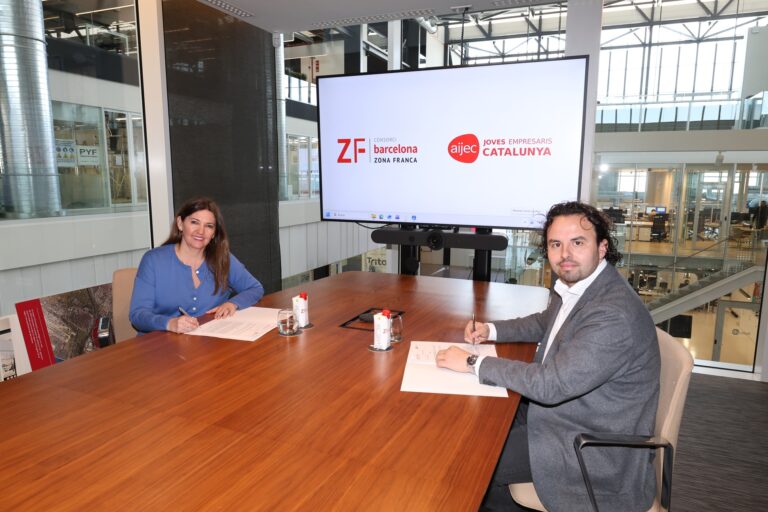Spanish Logistics departments in increase their commitment towards SDGs

Barometro Logistico
18 de April de 2023
- 5% of companies says that they will carry out practices towards achieving UN’s 2030 Agenda Sustainable Development Goals.
- 974 Logistics and Supply Chain managers have been part of the Logistics Circle Indicator at SIL 2023; they affirm that quality (82.6%), experience (64.6%) and savings (58.3%) are the most important points when outsourcing logistics services.
- Forecast for investment is increasing at industrial companies for the next 5 years in order to adjusting towards Industry 4.0; logistics manager importance is increasing within companies.
Barcelona, 18th April 2023. – This year 2023, SIL’s 23rd edition –leader fair in terms of Logistics, Transport, Intralogistics and Supply Chain in Southern Europe– is organising the 13th Logistics Circle Indicator 2023 where Logistics industry is profoundly analysed. 974 Spanish Logistics and Supply Chain managers –from different Industry’s sectors–have participated in this study as they are members of the Logistics Circle 2023. The profile of the sector of activity of the different Logistics or Supply Chain managers who participated in this 13th Logistics Circle Indicator:
94.5% of companies are committed towards SDGs
Other of the conclusions taken from the 13th Logistics Circle Indicator at SIL 2023 is that 94.5% of Spanish industrial companies express their commitment towards UN’s 2030 Agenda Sustainable Development Goals. This figure represents an almost-one-percent increase in comparison to last year’s indicator. Among them, 35.4% says that they are extremely committed with SDGs, a figure 5.6% higher in comparison to 2022 study.
41.8% of Logistics and/or Supply Chain managers who have been part of this study affirm that their companies are carrying out several actions towards achieving SDGs, which implies a light setback in comparison to last year’s figure.
Finally, the number of companies who manifest being slightly committed with UN’s SDGs has decreased (17.3%; 4% less than 2022). The companies who do not carry out any action towards achieving these goals are a 5.5%, a 0.9% less than last year.
Logistics manager, a position increasingly more important
Other of the conclusions taken from the 13th Logistics Circle Indicator at SIL 2023 is that more than a half of the Spanish industrial companies (58.9%) gives more importance to Logistics manager position and considers it a key role within the company. This figure is slightly higher than last studies; a 3.7% higher than last year.
34.6% of respondents thinks their own companies’ CEOs consider Logistics manager role as essential. This figure is a 7.7% higher than 2022’s one, as well as a 15.5% higher in comparison to 2019. At the same time, a 24.3% thinks that their own companies’ CEOs consider their role as extremely important –this figure is a 4% less than last year. Lastly, a 15.4% says their position is slightly regarded (21.1% in 2022); a 24.3% affirms that it should be more regarded (23% in 2022); and a 1.4% says that it is absolutely undervalued at their companies (0.7% in 2022).
Leadership, team management and strategic vision
“Leadership capacity” and “team management” are the most important attributes a good Logistics manager should have according to a 21.9% of Logistics or Supply Chain managers who have been part of this Logistics Circle Indicator’s edition. This figure represents a 1% more than last year. The second place is for “having a strategic vision” (18.5%; 1.9% more that in 2022).
Following the already-detected negative evolution at last year’s Indicator of the attribute “being analytic” –2020’s most regarded attribute–, this year it represents a 13.6%, a 0.3% less than last year. The same evolution characterises “planning ability” (12.1%; 12.5% in 2022) and Logistics manager “innovative ability” (10.3%; 11.7% in 2020; 34.5% in 2020).
“Bargaining power” (7.7%) occupies the 6th place, followed by “sympathy” (6.3%). In addition, “a good Logistics employee” is someone with “digital mind-set”, “good training” and who has “contacts”, according to the 974 Logistics or Supply Chain managers who took part of the 13th Logistics Circle Indicator.
More visibility for Logistics thanks to the Covid-19 pandemic
In recent years, the Logistics industry has gone from being an unknown to being considered by everyone as a key sector for the Economy and a sector of fundamental necessity. Covid-19 pandemic has undoubtedly been the main cause that has contributed the most to Logistics visibility as a fundamental-necessity industry among citizens. More than half of Spanish Logistics and Supply Chain managers –55.4% specifically– confirms that. This figure represents a 9.1% more than last year’s Indicator.
E-commerce is other of the main causes which has contributed to Logistics industry visibility as a fundamental necessity. Several managers agree on the current e-commerce boom (34.9%), but this figure is 6.7% less than last year. A 8.6% of Spanish Logistics and/or Supply Chain managers consider that the microchip supply crisis has also contributed to this, while only a 1.1% mentions other causes like the lack of professionals within the Industry or the necessity of other components for acquiring competitiveness.
Outsourced-logistics activities maintain stable
There are not important changes observed in the trend in terms of outsourced-logistics activities by companies. The most outsourced-logistics activity is undoubtedly transport, as it has also been observed at last Logistics Circle Indicators. 95.7% of the Logistics and Supply Chain managers who have been part of the 13th Logistics Circle Indicator at SIL 2023 says that transport services are outsourced at their companies. This figure has slightly decrease 0.5% in comparison to 2022. Therefore, transport is this category’s undisputable leader with a large distance from the second most outsourced activity, which is supply again (50.4%). Supply suffers a 2.4-percent decrease in comparison to last year, and an 8.9-percent in comparison to 2020.
Purchase activity receives the most important change in this category. Even though it maintains the 7th place –with 4.9%–, it increases a 1.8%.
Quality, experience and savings: the most valued points
Quality is still the most valued aspect –83.6%, a 0.2% slightly higher than last year’s study– by Spanish Logistics or Supply Chain managers in terms of outsourcing a logistics service.
“Experience and confidence” is the second most valued aspect, with a 64.6% –5.4% higher than last year’s Indicator. Savings occupies the third place with a 58.3%, 9.9% more than last year.
Another remarkable aspect at this year’s study is the drop of last year’s second place to the fourth one. This aspect is flexibility, with 47.9% (61.1% in 2022).
Rapidity (31.3%) and business optimization (10.4%) are two of the aspect which improve in comparison to last year.
Transport evolution and talent became two of the main logistics worries
“Service and quality” (21.5%) is still –for the second year in a row– the main worry for Spanish shippers. In spite of that, this figure is 0.4% less than last year. The second place is occupied by “efficiency and stock and expense optimization” (18.7%) with an extremely similar figure in comparison to 2022 (only a 0.2-percent drop). “Rapidity, punctuality and commitment” also suffers a 2.1-percent drop, but it maintains the third place with a 11.8%.
Sustainability becomes the fourth logistics worry for Spanish shippers (7.9%; 6.6% in 2022). It is important to say that last year sustainability occupied the sixth place, thus we observe a greater awareness towards sustainable points within the Industry.
“Transport industry evolution” –which occupies the sixth place– experience the most highlighted and significant changes of this category this year with a 7.1%. This figure is 2.9% higher than Logistics Circle Indicator 2022.
On the other hand, topics related to talent (recruitment of qualified staff) and HR experience a 1.4-percent increase and is the main logistics worry for 5.9% of the Logistics and Supply Chain managers from different Industry’s sectors who have been part of this year’s study.
Automated operations will shape the logistics of the future
Another conclusion taken from 13th edition of the Logistics Circle Indicator’s at SIL 2023 is the importance of “partnership in terms of transport” (28.4%) as the most important aspect of the future Logistics –as claimed by the Spanish Logistics and Supply Chain managers. The second place is occupied by “automation of operations” (27.1%), which means that they have exchanged positions in comparison to last year. “Partnership in terms of transport” increases a 2% and “automation of operations a 5%.
The third place is occupied by “standardised information exchange” (21.4%), a 2.7% less than in 2022. Other operations as “partnership in terms of storage” (10.5%; 7.7% in 2022) or “service customization” (9,8%; 7.4% in 2022) have significantly increased.
Forecast for investment is increasing at industrial companies for the next 5 years
With regard to the investments foreseen by companies for the next 5 years to adapt to the Economy 4.0, it should be noted that these investments are slightly higher than in the last Indicator, carried out in 2022. 55.4% of Spanish Logistics and Supply managers says that their companies will invest less than a million euros in order to adapt themselves to Economy 4.0. This figure is 1.1% higher than last year.
Nonetheless, it is observed that the gap where future investment is foreseen is also the one who receives greater investment (more than 50 million euros; 4% more than in 2022). In this sense, a 6.4% of Spanish Logistics and Supply Chain managers from different Industry’s sectors –who have been part of this year’s Logistics’ Circle at SIL– are thinking of making higher investments –more than 50 million euros– the next 5 years.
The “44-tons policy” is still leading, but its support decreases
13th edition of the Logistics Circle Indicator at SIL sees a drop in terms of shippers who are in support of the “44-tons policy” at road freight transport (56.9%; 58% in 2022; 65.7% in 2020). It is also important to highlight that the mayor part of shippers support the policy, but this backing is decreasing.
On the other hand, the number of people against the policy (14.6%) is still increasing in this edition, with a percentage 3.8% higher than last year, and 6% higher than in 2020. This issue seems to be irrelevant to a 28.5% of the respondents.



